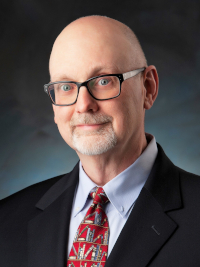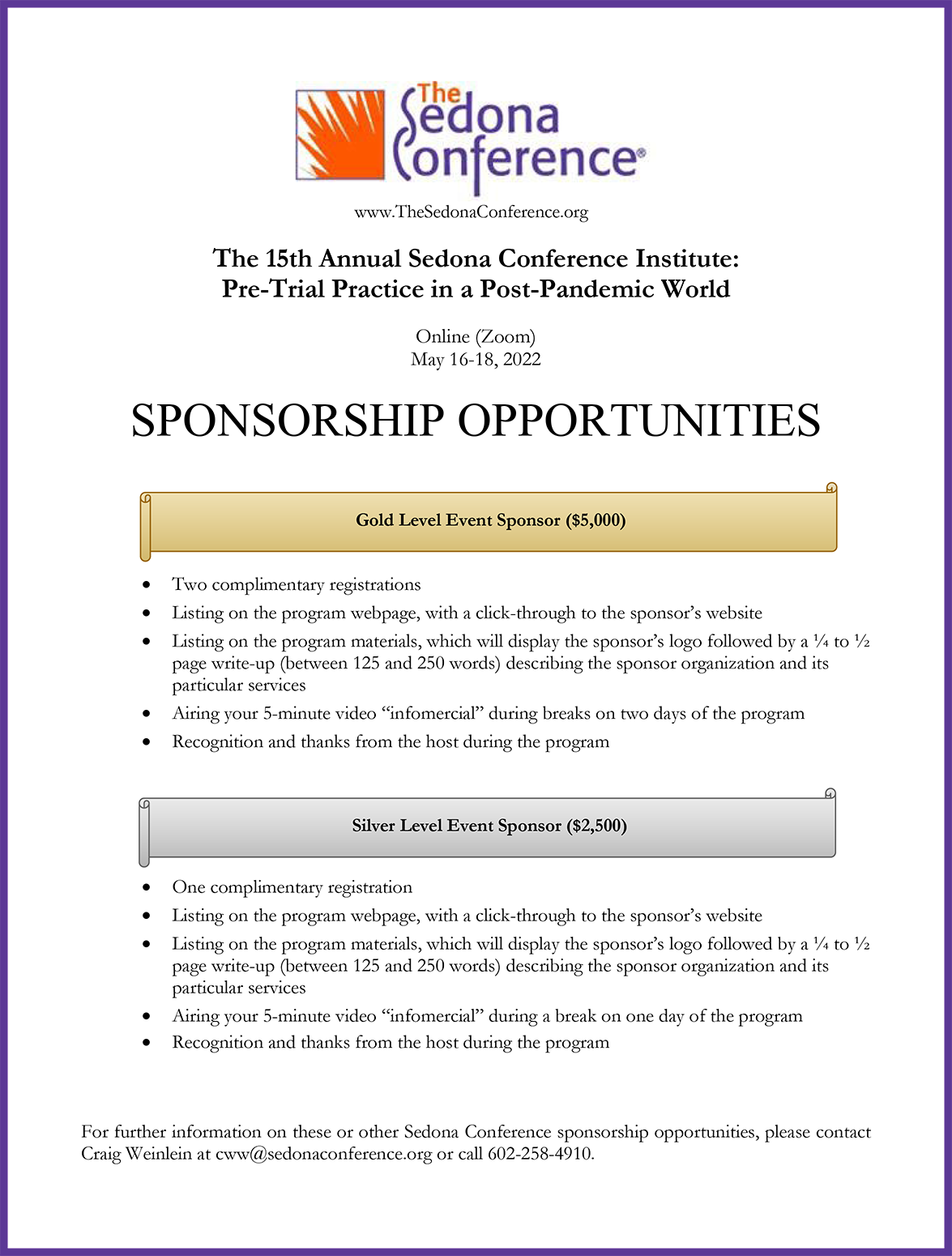| Time |
Session |
Panelists |
| |
Monday, May 16 (all times ET) |
* Panel Moderator |
| 11:15 — 11:30 |
Log-in |
|
| 11:30 — 11:45 |
Welcome & Overview |
Withers |
| 11:45 — 1:15 |
View from the Bench: Where are the Courts Headed?
|
Fleissig, Hedges, Kleinberg, Thumma, Withers* |
| |
In the past two years, courts have been forced to leap ten years ahead in technology adoption and law firms have been forced to accommodate entirely new ways of practice. Individual lawyers and their clients have been forced to adapt as well. In the process, we've found entirely new ways to deliver legal services and adjudicate disputes, from client interviews to jury trials. Some strategies have worked; others not so much. But we have the benefit of close study of these rapid changes, and the consensus is that we are not going back to the "old ways" of doing things. In this session, a panel of state and federal judges will reflect on their own experience and that of their colleagues and map out what they think the future holds for the "new ways" of virtual and hybrid practice, with special emphasis on discovery and pre-trial procedure.
|
| 1:15 — 1:45 |
Break |
|
| 1:45 — 3:15 |
eDiscovery Case Law Update: The Beat Goes On
|
Allman, Favro*, Gaston, Grossman, McShain, Petruzzi, Robinson
|
| |
The courts have been physically closed for most of the last two years, but litigants were still litigating, and judges were still handing down significant decisions on eDiscovery issues, including preservation, proportionality, form of production, privilege, spoliation, and more. EDiscovery scholar and case law tracker Phil Favro will lead a lively panel of veteran practitioners to dissect some of the more significant of these decisions and forecast some of the legal issues expected to surface in the remaining months of 2022.
|
|
| |
Tuesday, May 17 (all times ET) |
|
| 11:15 — 11:30 |
Log-in |
|
| 11:30 — 12:45 |
Crafting Requests and Responses Under Rule 34
|
Bailey*, Bays, Borrowman, Peck
|
| |
Recent amendments to the Federal Rules of Civil Procedure re-introduced proportionality factors into the permitted scope of discovery with the expectation that requesting parties will use them to craft focused requests and added provisions spelling out the responsibilities of responding parties. Boilerplate requests and responses are out, and "reasonable particularity" is in, but what does this mean in practice? A panel of experienced practitioners from both sides of the "v" discuss the impact of these changes and provide guidance for going forward.
|
| 12:45 — 1:15 |
Break |
|
| 1:15 — 2:30 |
eDiscovery Cutting Issue 1: It's Not Just Email Anymore |
Alleyne*, Cotulla, Evans, Schwartzreich
|
| |
EDiscovery exploded on the scene 25 years ago with the widespread adoption of networked computers and email in business, government, and personal life. This resulted in an explosion of the volume of discoverable information and a proliferation of formats and media. But discovery limited to email and word processing documents seems quaint today, with the arrival of social media, ephemeral messaging, databases, the Internet of Things, and cloud computing. Goodness knows what new medium is next on the horizon. This session explores the implications of this proliferation of new sources of discovery and provides practical guidance for cost-effectively incorporating them into an overall discovery plan.
|
|
| 2:30 — 3:00 |
Break |
|
| 3:00 — 4:15 |
eDiscovery Cutting Issue 2: It's You and Me Against the World, Baby
|
Backhouse, Jacob*, Jameson, Kenney, Melcher |
| |
One of the unique aspects of eDiscovery that sets it apart from conventional discovery is that the data being sought is often found on servers that are in the "possession, custody, or control" of non-party entities who provide computer services to one or more parties. These may be entirely independent entities such as Internet service providers or may be subsidiaries or parent entities of a party who operate computer networks for a consortium. In addition, these sources of discoverable data may be located outside of the immediate jurisdiction of the court, in foreign countries, or even "in the cloud," wherever that is, presenting a host of challenges in navigating different privacy and data protection regimes, data import/export controls, and even "state secret" restrictions. This session outlines the various challenges to non-party and foreign discovery and provides practical approaches to get the evidence needed to support a claim or defense without committing a privacy violation or creating an international incident.
|
|
| |
Wednesday, May 18 (all times ET) |
|
| 11:15 — 11:30 |
Log-in |
|
| 11:30 — 12:45 |
Establishing and Protecting (or Challenging) Privilege Claims |
Grossman*, Harradine, Kelston, Peck, Presnell, Want |
| |
There are exceptions to the discovery of some very narrow categories of otherwise relevant data, but the law surrounding attorney-client privilege and work product protection is complicated and highly nuanced. Properly identifying privileged or protected data, and defending or challenging that identification, can be costly and time consuming. The advent of eDiscovery added technical complications and sheer volume to the task. Both sides of the "v" in civil litigation have good reasons to be concerned, and some procedural rules are in place to facilitate cooperation in this area, but the process of privilege logging and dispute adjudication is still burdensome, with many traps for the unwary. This session explores these challenges and provides some creative solutions, based on the experience of veteran civil litigators and the advice of judges who have made tough decisions in this field.
|
|
| 12:45 — 1:15 |
Break |
|
| 1:15 — 3:00 |
Making the Record |
Bissoon, Chaikovsky, Fishman, Keller, Kolasinsky*, Selwyn |
| |
The goal of discovery in civil litigation is to document facts that support the claims and defenses of the parties, but it doesn't do the parties any good if the resulting discovery isn't admissible as evidence in court or if the presentation of the evidence doesn't result in a clear record of the proceedings that will support a judgment and a possible appeal. Collecting eDiscovery in forms that will be admissible and presenting that evidence clearly was complicated enough in the pre-pandemic world, and it is more complicated in the remote or hybrid litigation environment. This panel explores the legal, technical and logistical hurdles to authenticating and admitting electronic evidence, including some of the challenges for persuasive advocacy outside the traditional courtroom.
|
|
| 3:00 — 3:30 |
Break |
|
| 3:30 — 4:45 |
Ethics of Virtual or Hybrid Practice |
Blaustein, Hedges, King, Muchman, Riemann* |
| |
Virtual and hybrid practice poses a number of professional responsibility questions, some of them obvious and others subtle. It should be a given that attorneys have a responsibility to conduct themselves professionally, even from a home office (although we have some examples of "lawyers behaving badly"), but how many have considered the possibility that they may be practicing virtually outside of their bar jurisdiction? Have they instituted appropriate data security? Are they treating colleagues, opposing counsel, and court personnel with the same respect that they would in person? Are they keeping current with ever-changing local rules and protocols? This panel presents some of the issues that have come before court and bar disciplinary bodies during the pandemic, explains the rules that apply, and provides guidance to keep you on the straight and narrow. The ABA Model Rules will be addressed in this discussion.
|
|
| 4:45 — 5:00 |
Closing Remarks and Announcements |
Weinlein, Withers |

 The Sedona Conference
The Sedona Conference
